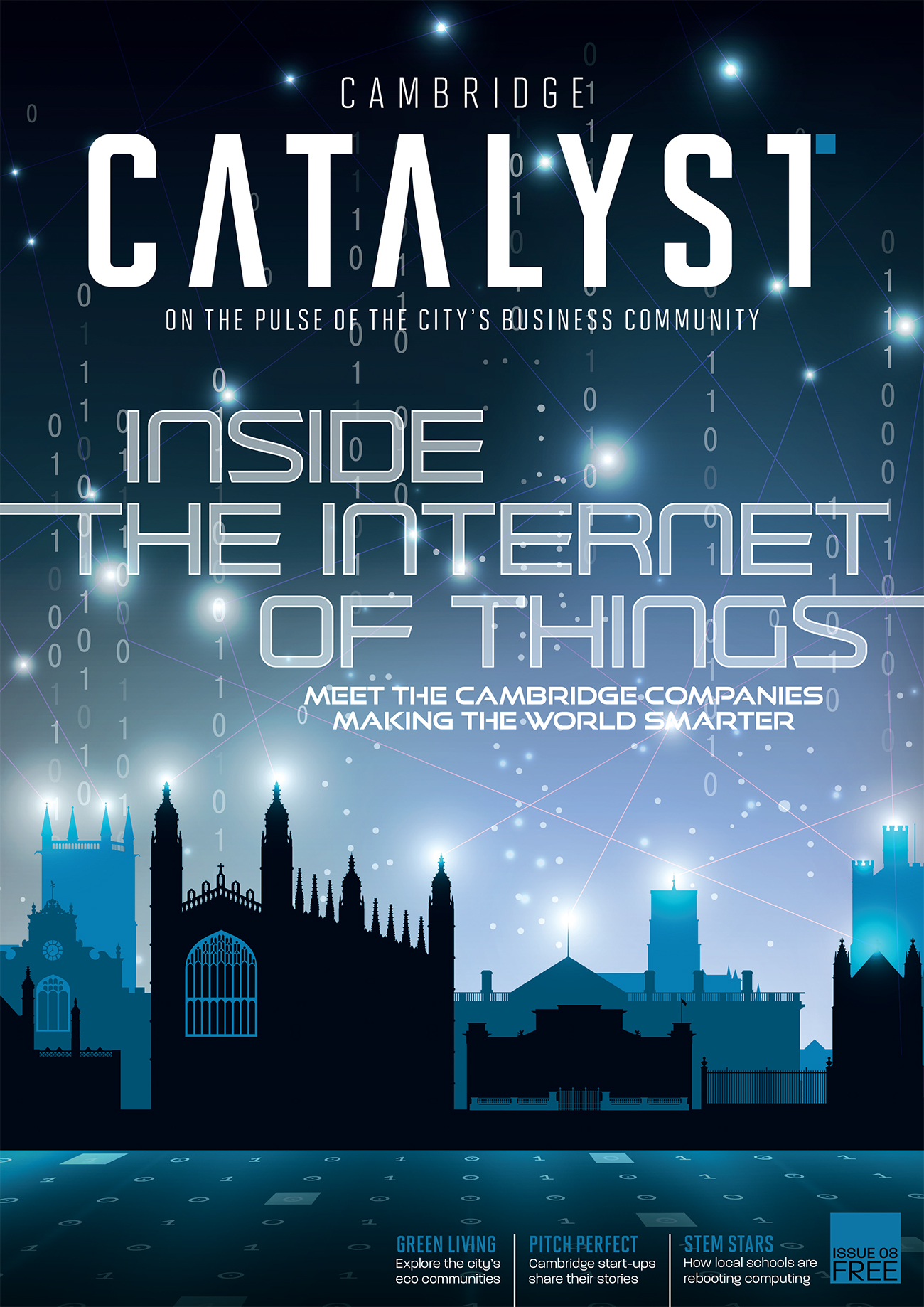
Tech trends to watch
Posted on Mar 31, 2020 by Matthew Gooding
Cambridge’s tech consultancies lead the way when it comes to developing new products and processes. Matthew Gooding spoke to a trio of experts to discover which innovations everyone will be talking about in the year ahead
As a new decade dawns, the pace of technology change shows no signs of slowing down. Where the 2010s saw the growth of voice-activated technology, virtual reality and a new wave of artificial intelligence excitement, the 2020s are poised to give us dramatic advances in food, medicine and mobility.
“The last ten years have delivered multiple, mainstream shifts, from smartphones to subscription video on demand; from cloud computing to biometric authentication; from near-perpetual connectivity to ever broader, deeper data trails,” says Deloitte’s Paul Lee, co-author of the firm’s recently released report on trends in UK technology, media and communications.
“The next ten years are likely to be equally disruptive, with some of the most significant technology advances in our lifetimes having their foundations in 2020.” Among Deloitte’s predictions for the year are that 5G is ready to revolutionise enterprise communications, while the podcasting boom will continue, with the industry set to be worth £20m in the UK and £1.1bn globally by the end of the year.
2020 could also be the year electric bikes really make their mark, and Deloitte predicts that over the next three years 130 million of the vehicles will be sold around the world, driven by lower costs and advances in battery technology. Given the volume of bikes already on the roads around the city, it’s doubtful we’ll notice much of a change here.
Making predictions is always a tricky business, but if we are to see such advances across a broad range of technology areas, it’s likely Cambridge’s myriad tech consultancies will be behind the most innovations. While much of their work goes on under the radar, the consultancies’ teams of scientists and engineers collaborate with some of the biggest names in business, developing new technologies and improving products and processes.
 It's likely Cambridge's myriad tech consultancies will be behind the most exciting innovations
It's likely Cambridge's myriad tech consultancies will be behind the most exciting innovations
Cambridge’s unique network of tech consultancies has its roots in the original ‘Cambridge Phenomenon’ which began in the 1960s, when Tim Eiloart and David Southward, a duo of Cambridge University graduates, founded Cambridge Consultants to “put the brains of Cambridge University at disposal of the problems of British industry”. Many other consultancies have since sprung up, serving different sectors and bringing different areas of expertise to the table. But what do they expect to be working on in the next 12 months and beyond? We spoke to three experts to find out what they think is in store in 2020.

TTP
The millions of New Year diets and fitness regimes being undertaken earnestly around the world this month cannot mask the fact that we’re all getting older. In 2015, over-60s on the planet numbered some 901 million, a figure which, by 2050, is expected to have soared to 2.1 billion.
With that in mind, Sam Hyde, managing director of TTP, believes the conundrum of the ageing population is going to occupy plenty of scientists as we move into 2020 and beyond.
“Healthcare is one of our three key sectors, and the challenge around ageing isn’t going away,” he says. “People have been talking about the ageing population for a while, the global increase in life expectancy driven largely by better treatments for cardiovascular diseases; the mortality rate for these conditions has halved in the last decade, and other improvements followed as other disease areas came to the fore.
“The new frontier is to ensure that other disease areas can have the same level of attention and benefit from the same effect, and key to this will be genetics. Not only does this allow us to go in and subtly fix things, it can also help give us a better understanding of the process of ageing. It’s a really interesting area, especially with the emergence of new methods such as long read length sequencing.”
TTP is working on a number of genetics projects, as well as using its expertise in other areas of life science, such as diagnostic testing. The company has been working on a project which would allow flu testing to take place remotely, away from the clinic, to try and ensure that patients who are infectious don’t have to visit their GP.
Sam has been with TTP for 22 years, and joined from Ionica, the Cambridge firm that famously developed a wireless phone network which briefly looked set to revolutionise the sector before its abrupt demise in 1999. He maintains a professional interest in the telecoms sector, and says:
“TTP has been involved in GSM, 3G and now 5G, which we’ll hear a lot more about in the next year. There’s an interesting challenge coming there around the opportunity for satellite-driven networks, and their convergence with traditional cell-tower terrestrial networks. Lots of people are playing around in space now because it’s getting easier and cheaper to get satellites up in the sky.”
 People have been talking about the ageing population for a while, the global increase in life expectancy driven largely by better treatments for cardiovascular diseases; the mortality rate for these conditions has halved in the last decade
People have been talking about the ageing population for a while, the global increase in life expectancy driven largely by better treatments for cardiovascular diseases; the mortality rate for these conditions has halved in the last decade
Alongside healthcare and telecoms, Melbourn-based TTP is also active in the industrial and consumer spaces. The company is one of the best-known names in the Cambridge Cluster, and Sam says its blend of researchers and technologists is key to its success.

He says: “We have a bunch of scientists and engineers doing what they love, who are passionate about technology and how it can create value.
“Our role is to mix these people together. We’re not a massive firm with layers and layers of management, and I think this is one of the areas where Cambridge and the consultancies excel – we’ve got a great pool of people and we don’t over-manage them, we just try and create the perfect environment for collaboration.”

42 Technology
“Three or four years ago, if you went to a food and beverage conference everyone was talking about sugars,” says Adrian Swinburne of 42 Technology. “But for the last couple of years the hot topic has been sustainability.” This is of course no surprise; the sustainability issue has hit every area of business squarely in the face in recent years, and is a particularly big headache for the food industry, which carries a potentially troublesome burden – packaging.
Though the UK recycles over 65% of its packaging, millions of tonnes of discarded waste still disappears into landfill each year.
Adrian, who looks after the consumer sector at design and engineering consultancy 42 Technology, says companies are increasingly looking for novel ways to mitigate their packaging problem. “Sustainability is a major theme across all of 42 Technology’s consumer sector clients, particularly sustainability of packaging,” Adrian says.
“We’re already working with clients on more sustainable packaging solutions, either through using different materials or switching from mixed to single material packaging. Often it’s just about making things simpler for recycling purposes. If you have got to take lots of bits out and wash them out before they can be recycled, that’s a barrier for the consumer and a challenge for producers. We’re helping our clients to address that challenge.
“We’re seeing more and more clients looking at the replacement of anything made of moulded plastic materials,” he continues. “Printed, flexible electronics are also becoming more commonly available and are getting towards the kind of cost points that could enable smart packaging. This could have implications on ease of recycling in both a positive and negative way.”
 Though the UK recycles over 65% of its packaging, millions of tonnes of discarded waste still disappears into landfill each year
Though the UK recycles over 65% of its packaging, millions of tonnes of discarded waste still disappears into landfill each year
But sustainability comes in other forms too, and Adrian believes there’s also a shift happening in manufacturing processes. “Process innovation to improve manufacturing is very important to a lot of our clients in the consumer sector, because they all want to increase productivity,” he says.
“New equipment comes with high capital cost, and companies are looking at how far they can push their existing assets rather than invest in whether that is by increasing throughput for current products or by unlocking latent functionality to enable new products.
“It’s my belief that 42 Technology does more in this area of manufacturing processes than many of the other consultancies. It’s not the most glamorous part of tech, but it’s very important.”

Founded in 1998 and originally focused on the design of power tools, 42 has since expanded to cover other sectors including energy and transport, as well as consumer goods. Adrian says that the company has become an expert in the art of the possible.
“We’re a practical engineering company, and while we do really creative blue-sky innovation work, when we talk to customers the conversation very quickly gets grounded in what is possible, how it will work in practice, and what can be achieved at an acceptable manufacturing cost,” he says.
“Businesses want to know how new ideas can be translated into real world solutions, and being practical tends to resonate with our clients.”

Sagentia

Alun James has been with Sagentia for 20 years, and no-one is more surprised by this than the man himself. “I moved to Cambridge in 2000, and never thought I’d spend the next 20 years working for one company,” he says.
“But in that time I’ve spent three years working in a start-up within the group, I’ve done business development, I’ve managed profit and loss and now I have the chief technology officer role. I love that variety and it’s been a great learning experience to be put in so many different situations.”

As CTO, Alun is now responsible for maintaining Sagentia’s reputation for technical excellence in areas such as agritech. He feels this sector could be key as communities around the world look to come to terms with the effects of the climate emergency.
“When you look at the issue of climate change, and what’s going on in Australia and other places at the moment, agritech is going to become increasingly important,” he says.
“It covers everything from how we can improve animal breeding programmes, to genetically modified plants which have had their genes edited to make them more resistant to disease. It might not be the sexiest technology area but it’s really fascinating.”
Public perception of genetically modified crops – so called ‘Frankenstein foods’ – has not always been overwhelmingly positive, but Alun says this is starting to change.
He adds: “It did have a negative image, particularly in the UK and Europe, but what we’re seeing now is much more precise intervention, unlike in the past where people would just change a load of genes to see what would happen.
Having worked in Cambridge for two decades, Alun believes the strength of Sagentia is partly drawn from the city’s famous and unique ecosystem.
 When you look at the issue of climate change, and what’s going on in Australia and other places at the moment, agritech is going to become increasingly important
When you look at the issue of climate change, and what’s going on in Australia and other places at the moment, agritech is going to become increasingly important
“As consultancies, whether it’s us or any of the others, we all have our niches,” he says. “At Sagentia we are really focused on the technology around science. We have a great team and having our team be able to work across sectors is really important. We move people around, and you might be working in food and beverage one week, then move on to a completely different industry the next. Having that ability to look at different areas is where innovation comes from.

“The Cambridge Cluster is also massively important, and the effect of that clustering is the way we differentiate ourselves from the rest of the world. Other people try and use the model, but it’s never been replicated anywhere else in the world. We have a hotbed of innovation here, a highly talented group of people with the ability to solve a lot of the world’s problems.”



